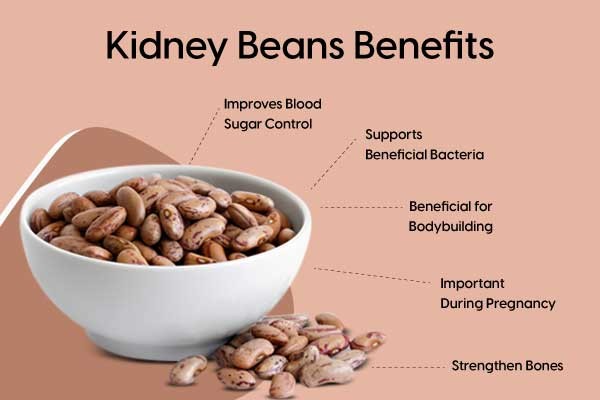
Contents
Kidney Beans: Nutrition Facts and Health Benefits
Kidney beans are reddish-brown and have a mild flavor when boiled. Along with vital nutrients like complex carbs and fiber, these beans are rich in folic acid, calcium, and proteins, all essential for healthy functioning.
Nutrition Facts
The U.S. Food and Drug Administration provides the following nutritional data for half a cup (90 grams) of cooked red kidney beans without added salt or oil.
| 113.5 |
| 0.5 grams |
| 198 mg |
| 20 grams |
| 6.7 grams |
| 0.3 grams |
| 7.8 grams |
Carbs
Kidney beans are a good source of complex carbohydrates, which are low in calories and high in fiber. They contain starch, which provides immediate energy, and a small amount of naturally occurring sugar. The fiber in kidney beans promotes fullness, stabilizes blood sugar, and enhances digestive health.
The glycemic index (GI) of kidney beans is about 24, making them a low-glycemic food that prevents spikes in blood glucose levels.
Facts
Kidney beans are a naturally low-fat food, containing less than one gram of fat per half-cup serving. The fat in kidney beans mainly consists of monounsaturated and polyunsaturated fatty acids, which are beneficial for health.
Proteins
Kidney beans are a great plant-based protein source, providing almost eight grams of protein per half-cup serving. However, they do not contain all the essential amino acids. To ensure a complete protein intake, consume a variety of whole grains, legumes, or seeds throughout the week.
Vitamins and Minerals
A 100-gram portion of cooked kidney beans provides 33 percent of the daily requirement for folate, which contributes to red blood cell synthesis. They also contain thiamin, vitamin K, vitamin B6, vitamin C, riboflavin, niacin, pantothenic acid, phosphorus, manganese, copper, potassium, magnesium, and iron.
Health Benefits
Kidney beans contain vitamins B1, B2, B3, B5, B6, B9, C, E, and K, along with bioactive substances that support healthy metabolism regulation.
- Prevent Cancer: Kidney beans lower the risk of colon and pancreatic cancer due to their high fiber content. They also contain bioactive substances that act as antioxidants and cell rejuvenators, which help prevent diabetes.
- Control Metabolism: Kidney beans regulate metabolism by modulating the blood’s glycemic index. The fiber in kidney beans supports a healthy metabolism.
- Aid in Weight Loss: Including kidney beans in a low-carb diet can help with weight loss. The high fiber content provides satiety and the high protein content satisfies the body’s energy needs.
- Promote Digestive Health: Dietary fiber in kidney beans promotes bulkier stools, satiety, and sustains intestinal microbiomes.
- Enhance Cognitive Function: Kidney beans contain vitamin B1, which is essential for optimal brain function, focus, memory, and cognitive health.
Question
Potential Side Effects
Raw kidney beans contain lectins and phytohemagglutinin, which may harm intestinal health. To eliminate these risks, soak and fully cook kidney beans before consuming them.
Antinutrients in kidney beans reduce the nutritional value of other foods and may hinder digestion. Soaking and boiling the beans can help remove these substances.
Canned kidney beans are safe to eat as they have been cooked and sterilized before canning.
How to Prepare
Rinse dried kidney beans and remove any broken or cracked beans before cooking. Soak them overnight in cold water.
Add one cup of beans to three cups of boiling water. Simmer for at least 30 minutes or until desired taste and texture are achieved.
Kidney beans can enhance the flavor and nutrients of soup, stew, or salad dishes. They can be substituted with pinto beans or black beans in recipes.
Conclusion
Kidney beans offer numerous environmental and health benefits. They help control the glycemic index, lower cholesterol, aid in weight loss, and reduce the risk of colon and pancreatic cancer. By substituting meat with kidney beans, you can also minimize your carbon footprint and contribute to environmental sustainability.
Incorporating kidney beans into your diet is cost-effective, environmentally friendly, and convenient, as they are available all year round. Make a positive impact on your life by including kidney beans in your meals.


